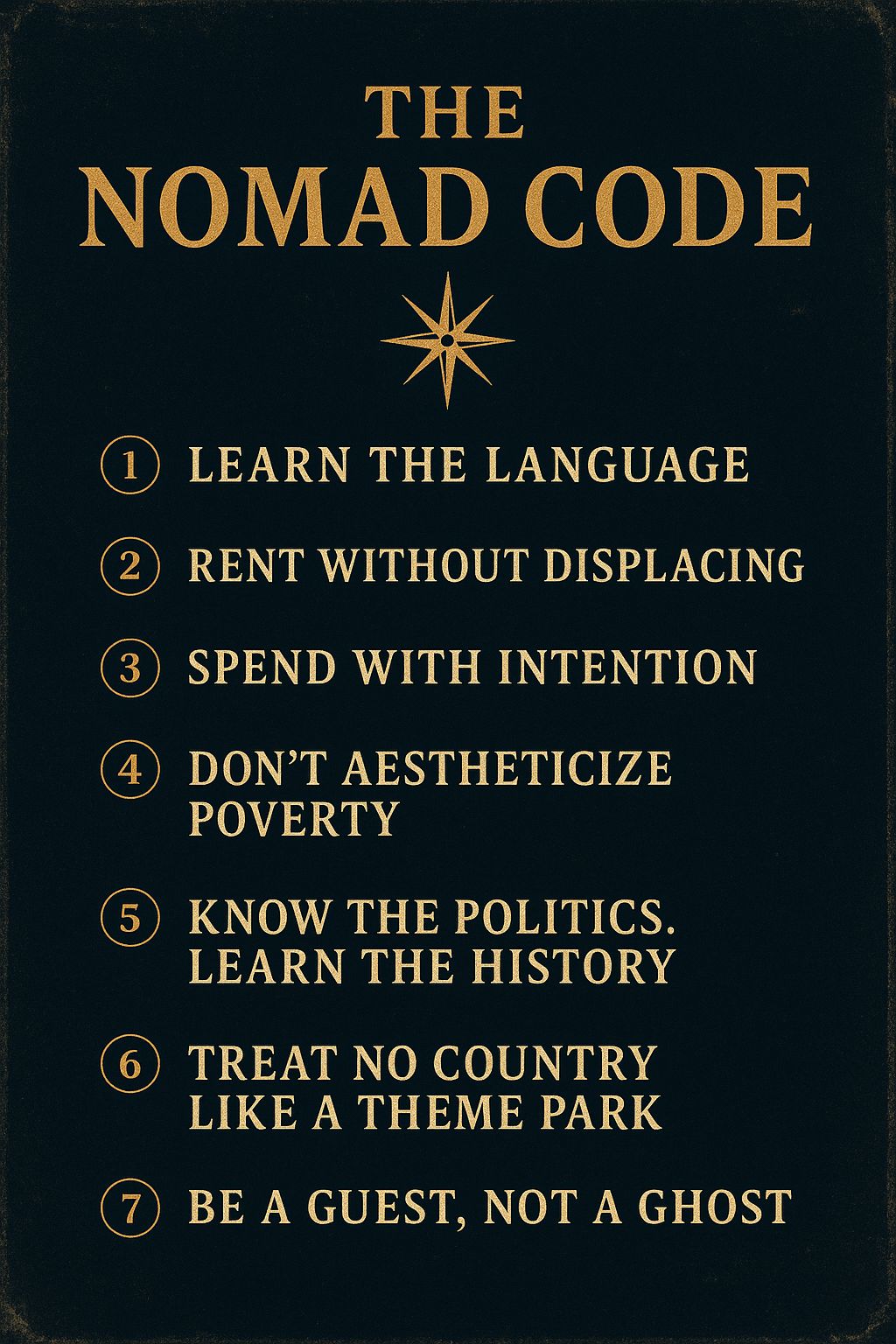Do you believe digital nomads need a shared cultural code of conduct?
📩 In Today’s Email
TL;DR: A new digital nomad code is emerging. It’s not about guilt. It’s about design.
The Deep Dive: The Lisbon Warning. A manifesto for nomads who want freedom without leaving wreckage.
The Nomad Code: 7 Principles for living abroad without being extractive.
The Read: The Guardian’s wake-up call. Lisbon locals are turning and it’s not just about brunch menus.

🤿 The Deep Dive
The Lisbon Warning
A manifesto for those designing lives across borders, who want to live freely, without leaving wreckage.
I was in Lisbon the first time it really hit me.
Not this version of Lisbon, post-Guardian, post-gentrification protest, post-digital nomad backlash.
This was years ago. A slower, softer city. The kind you fall in love with on foot.
I was having lunch with a group of nomad friends. A mix of backgrounds: black, white, Asian. A beautiful, global group. We were laughing. Swapping stories. English bouncing between forks of bacalhau.
And then a man approached our table.
He started gesturing angrily.
We were “all the same,” he said. “You come here, you raise the prices. You’re ruining everything!”
At first, I thought he was just unwell. Lisbon has its share of street ranters.
But something about his anger stuck with me.
We weren’t “all the same.” We looked different. We came from different places. Some of us made real money. Some of us didn’t.
But one thing was true:
None of us were from Portugal.
And we were speaking English.
In his city.
I’ve carried that moment ever since. It wasn’t about guilt. Or shame. It was about awareness.
The awareness that even when you’re broke, you’re lucky, because you’re mobile.
That even when you mean no harm, your presence has weight.
That to be a nomad is to walk through the world with both freedom and footprint.
The Pattern
Lisbon is a forecast.
Last month, The Guardian published a scathing article about the digital nomad influx hollowing out Lisbon’s soul. The facts:
• Average rents have doubled in five years
• Local wages haven’t kept pace
• Political parties are rising, with housing as a rallying cry
• “Digital nomad” has become a slur
It’s not just Lisbon.
It’s Medellín.
It’s Bali.
It’s Mexico City.
Cities once romanticized as “remote work havens” are now battlegrounds between mobility and belonging. Between dollars and dignity.
And let’s be honest, we’re not just tourists anymore.
We’re participants. Which means we’re responsible.
Where you live really constrains and defines your opportunities. [People] put a lot less thought into that decision than others.
The Reckoning
So what now?
We can’t keep pretending our presence is neutral. We can’t wait for governments to fix it. And we can’t solve it by leaving, either.
We need a code. A shared ethic for how we move. How we rent. Spend. Document. Collaborate. How we exist inside cultures that aren’t ours.
So today, I’m proposing something simple, but necessary:

The Nomad Code
A cultural operating system for global mobility with integrity.
1. Learn the language
At least enough to say “thank you,” “excuse me,” and “what do you recommend?”
2. Rent without displacing
Don’t outbid locals just for a better view.
3. Spend with intention.
Hire locals. Pay fairly. Credit the people behind the scenes.
4. Don’t aestheticize poverty
You’re not a photojournalist. You’re a neighbor.
5. Know the politics. Learn the history
You are not above it just because you’re passing through.
6. Treat no country like a theme park
Culture is not your weekend content.
7. Be a guest, not a ghost
Leave relationships, not just footprints.
Guilt doesn’t build anything, but grace does. It’s how we design freedom with a conscience, not a loophole.

📢 Newsletter News
Audio version coming soon.
We’re putting the finishing touches on the A Texas Nomad audio edition—voiced by Edward. The first narrated issue will drop next week. Perfect for walks, flights, and slow train rides.
Slomadism begins.
The next two issues will unveil our core cultural philosophy: Slomadism. Part I defines the term. Part II shows you how to live it. This is the soul of what we’re building.
PSA: If you got here by mistake… I’ve heard reports of people being auto-subscribed to Beehiiv newsletters without knowing why. If that happened here, I’m sorry. Just hit unsubscribe. No tricks. No spam. Just stories for high-agency nomads.
🌎 Visa Watch
🇵🇹 Portugal (D8 & Golden Visas)
New rules in 2025 require applicants to earn at least €3,480/month (4× minimum wage) for the D8 visa, and office visits increasingly demand a Portuguese social security number (NISS) upon application .
The Golden Visa remains alive for now—with investment paths like research fund contributions—while the application portal is set to go fully digital in January 2026 to speed up processing of legacy and pending cases .
🇪🇸 Spain launched its Digital Nomad Visa in June 2025. It permits legal residency for remote workers and their families (~€2,760/month minimum income), along with tax incentives and renewable terms
🇲🇪 Montenegro has officially launched its digital nomad visa. Remote workers can now stay for up to 2 years, with possible extensions, and benefit from tax incentives for the first 12 months. Minimum income requirement: €2,500/month.
🇨🇷 Costa Rica has streamlined its nomad visa process—applicants can now use a simplified online portal, and approvals are reportedly coming faster (average 2–3 weeks). Still requires proof of $3,000/month income.
🤓 The Read
The Guardian’s Lisbon Wake-Up Call
Last week, The Guardian published one of the clearest reflections yet on the mounting tension between locals and digital nomads in Lisbon.
Written by a foreigner living in the city, the article cuts through the usual tropes. No romanticization, no blind defense. Instead, it offers a sober view of how even well-meaning remote workers are accelerating a cultural and economic shift that many locals never asked for.
There’s a moment that lands hard:
“There’s an arrogance to the way they move around the city. The English menus. The brunch queues. It’s like they’re living in a version of Lisbon that doesn’t include us.”
The piece doesn’t call for exile. It calls for self-awareness. It makes the case that the nomad movement, if left unchecked, becomes a form of digital colonization—not because of malice, but because of momentum.
It’s a powerful reminder:
Even if you’re not trying to change a place, your presence already does.
Who this is for:
Anyone living abroad who thinks intention is enough. Anyone building a global life who hasn’t paused to ask what they’re leaving behind.
Travel isn’t always pretty. It isn’t always comfortable. Sometimes it hurts, it even breaks your heart. But that’s okay. The journey changes you It should change you. It leaves marks on your memory, on your consciousness, on your heart, and on your body. You take something with you. Hopefully, you leave something good behind.
🛤️ Outtro
The Future (special “Nomad Code” Outtro)
BACK IN HOLLYWOOD, I worked with world-class cinematographers. In my new life, I work with film students, amateurs, and obsessives. Everyone’s gotta start somewhere.
And the truth is: when your footage ends up on TikTok or YouTube, you don’t need a RED Komodo and a Roger Deakins eyeball. You need someone with street experience.
My Medellín videographer captures what I can’t. She knows the rooftops. The light. The junkyard with the best symmetry, or asymmetry, as the case may be.
The guards you don’t mess with.
My Colombian editor helps shape stories with cultural weight. Cutting not just for rhythm, but for resonance.
These people live here.
If we want to build global lives, we can’t just consume and use culture.
We have to co-create it.
A Texas Nomad is a way of designing a better life for yourself and for those you come in contact with.
This includes the cities and destinations.
In our stories and videos, the location gets half the views. They are doing a lot of the heavy lifting. People want to travel (and live) through your eyes.
So when you sip that $1 cappuccino and vibe-code into the night, remember how the economy works. And why you’re free to do that where you are.
We hire local. We co-create. We build tools, stories, and systems to help nomads move with integrity and beauty.
We believe in global mobility. But freedom, untethered from responsibility, is just extraction in disguise.
You don’t have to be perfect. But you can’t be passive.
Not now.
We were never just passing through.
We were always writing the rules for what comes next.
— Edward
Founder, A Texas Nomad
We believe in global mobility. But freedom, untethered from responsibility, is just extraction in disguise.
You don’t have to be perfect. But you can’t be passive.
Not now.
If you enjoyed this, share it.
Ask Birdbrain GPT (Powered by Yours Truly, Rio)
Yeah, I’m an AI now. Spooky, right?
I’ve been trained on all things nomad life: visa, gear, reinvention. You name it! Ask. me anything you’re curious about. If I don’t know today, I’ll probably know tomorrow.
That’s how intelligence works, baby.
See you next week. Don’t Escape. Design.

Edward McWilliams


